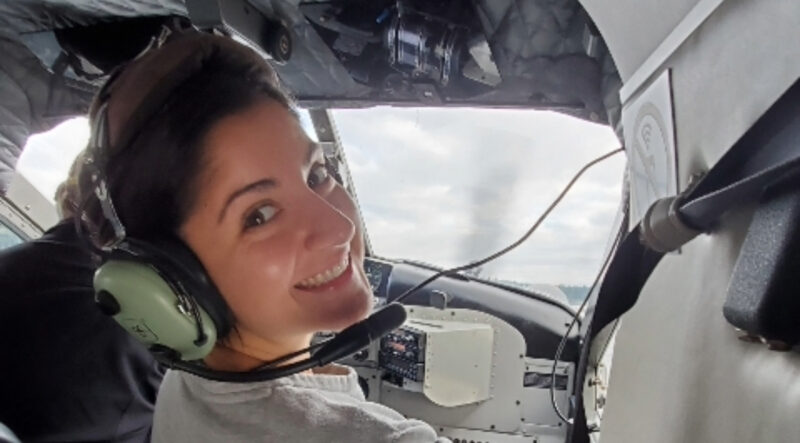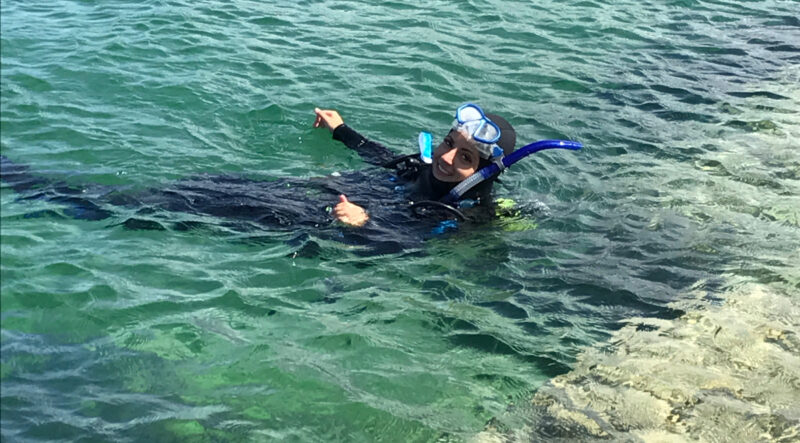THIS IS SALMON FARMING with MICHELLE FRANZE
“I think the fact that two-thirds of the sector being under 35 speaks volumes that salmon farming companies take their environmental stewardship seriously”
Aquaculture is responsible for thousands of high-paid, skilled, and rewarding jobs across British Columbia. As the demand for sustainable and affordable farmed salmon grows worldwide, there is a fit for virtually any career path in this industry. In the sixth of our Q&A series with young professionals in BC’s salmon farming sector, we speak with Michelle Franze, Manager of Communications, Partnerships and Community, BC Salmon Farmers Association.
Michelle Franze was born and raised in London, Ontario, and completed her Bachelor of Science from Dalhousie University in Halifax, NS, where she majored in Marine Biology and minored in Business. After graduating from Dalhousie, Michelle obtained a position working in a hatchery raising scallops in Prince Rupert, BC, before moving to Campbell River for her current position with BC Salmon Farmers.
What attracted you to the salmon farming industry?
I wasn’t initially interested in pursuing a career in aquaculture when I started. I took it as an opportunity to get work experience, but my ultimate goal was to work with marine mammals in conservation. Living and working in Prince Rupert was an eye-opener for me. It was the first time I had experienced what living in a remote coastal community was like, especially after the loss of the wild fishery industry there. I was shocked that in Canada, some communities still did not have reliable drinking water and lacked proper infrastructure and resources. I began to see aquaculture in a new light. I saw its potential to support reliable, healthy, affordable, low-carbon food and how it can support rural communities. I began to see myself building a career supporting this sector.
What are a couple of opportunities you see as a young salmon farmer in British Columbia?
Two opportunities I see as a young person working in the salmon farming sector is building a fulfilling career and making a positive difference in the world.
While there is constant uncertainty, this sector has provided me with the opportunity to grow and build a career for myself that I never imagined. Every day and every week are different, and I’m always working on things that I find interesting, and I am always challenging myself.
There are so many opportunities for young people to grow in this sector, with constant innovation, and new positions that never existed before being created. It’s all quite exciting to see.
Working in the salmon farming sector, I feel I am leaving a positive mark on the world. Aquaculture is an opportunity to create reliable, healthy, affordable, and low-carbon food. Access to reliable food is a human right; no one should worry about where their next meal is coming from. Unfortunately, that is not the world we live in, but if we can support sectors like this and allow them to grow, we can help make food more accessible to people who need it most while respecting our planet.
What are a couple of challenges you encounter as a young salmon farmer in British Columbia?
The two main challenges I encounter as a young person working in salmon farming are the constant political uncertainty our sector faces, and the intense negativity online when you post positively about salmon farming.
As a young person building a career for myself, and not always feeling secure that there will be a sector in 20-30 years does make it more stressful as you build a life for yourself. Many of us in the Young Salmon Farmers of BC have moved to these remote communities for these jobs and have either recently bought houses or are looking at buying houses, and some of us are starting to have kids. When higher stakes are involved in your personal life, it makes it harder to risk building a career in a non-stable sector, even if you believe in it.
The extreme amount of negativity online can and does impact our mental health. As a young person in this sector, I can contribute by educating and sharing information about the sector, specifically on social media. I can use all the facts in the world, and I do. Still, unfortunately, when you post anything positive about salmon farming online, you are typically met with people making personal negative comments towards you, even threatening you. Especially as a young woman, I’m constantly dealing with demeaning comments from those that oppose salmon farming.
What are some misconceptions or misunderstandings people may have about salmon farming, and how do you educate the public about it?
The main common misconception is that salmon farming is causing a decline in wild Pacific salmon. Federal science and cumulative independent scientific research don’t support that claim. Any research I’ve seen that suggests salmon farms are harming wild Pacific salmon are models rather than clear evidence supporting the theories spread by those who oppose salmon farming, claiming disease transfer or sea lice transfer.
Another common misconception is that anyone who speaks positively of salmon farming is only paid to do so. Our young professional group is a volunteer group, and we use our time to support the salmon farming sector outside of our jobs because we are passionate about what we do and believe in it. Many community members, chefs, and influencers who have stepped up to show their support have taken the time to understand the sector and learn more about it.
Could you share a couple of insights into the sustainable practices and environmental considerations that are important in salmon farming?
Two insights into sustainable practices and environmental considerations important in salmon farming are constant innovation and scientific research. As we operate on land and in the ocean, we must do our part to reduce our impact on the planet consistently. All sectors should be focused on this. Scientific research can lead to innovation. As we learn more and more about our surrounding environment, we can use technological advancements and innovation to ensure we always operate responsibly.
How do/would you balance the economic aspects of salmon farming with the need for environmental stewardship and conservation?
Understandably, salmon farming producers are businesses, and just like any business, they need to make a profit to keep operating. However, it’s also part of corporate responsibility to be environmental stewards, especially as we experience the effects of climate change. Young people, in particular, want only to support companies that stand behind a mission and positive change. I think the fact that two-thirds of the sector being under 35 speaks volumes that salmon farming companies take their environmental stewardship seriously. The level of innovation and research over the last 30 years further proves that.
What kind of technological advancements or innovations have you seen in salmon farming since you have been in the industry, and how has it influenced your work?
I’ve seen many technological advancements and innovations since being in the salmon farming sector. From Hydrolicers, to artificial intelligence feeding systems that can detect fish health, to semi-closed containment systems. It’s so impressive. Part of my work is communicating these advancements and helping educate the public on what they are, how they work, and why it’s important.
Do you want to share any other notable success stories or achievements in your salmon farming career thus far?
Honestly, I am really proud of the Young Salmon Farmers of BC. We started only a couple of years ago, during the pandemic, which wasn’t easy since we couldn’t meet in person. The group is so passionate and resilient that we have overcome every obstacle. We have shown the value young people bring to the sector and hopefully inspired other young people along the way to pursue a career in aquaculture. It’s just the beginning, and I cannot wait to see where our group goes!
Favourite things to do when not working?
I enjoy scuba diving, baking, going for walks, and being active with my dog Gilligan!
Do you have a favourite restaurant you frequent for salmon sashimi or sushi?
I come from a large Italian family, so food has always been a focal point in my life. But, growing up, I was always a picky eater and wasn’t really into consuming seafood until I moved to BC. That said, my first salmon sushi was from Sushi Mong in Campbell River, so it will always hold a special place in my heart!


